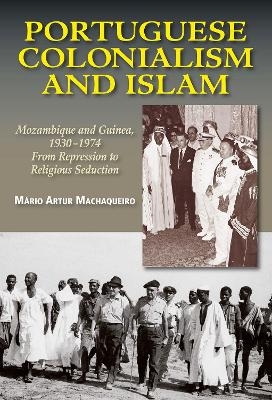
Portuguese Colonialism and Islam
Mozambique and Guinea, 1930 –1974: From Repression to Religious Seduction
Seiten
2023
Liverpool University Press (Verlag)
978-1-78976-191-7 (ISBN)
Liverpool University Press (Verlag)
978-1-78976-191-7 (ISBN)
In Mozambique and Guinea, the Portuguese colonial administration had to deal with Muslimcommunities of significant population expression and whose internal cultural differentiationspresented a complexity to which the administrative power was often unprepared.
In Mozambique and Guinea, the Portuguese colonial administration had to deal with Muslim
communities of significant population expression and whose internal cultural differentiations
presented a complexity to which the administrative power was often unprepared. The exercise of
this governance, with all the variations that characterized it, extended throughout the period that
the colonial project lasted, from the phase of effective military occupation, in the transition from
the nineteenth to the twentieth century, until the end of the colonial wars in 1974.
In this chronological segment, Portuguese Colonialism and Islam seeks to address the
circumstances of the colonial governance and regulation of those populations, focusing on:
(1) The representations and images of Islam and Muslims that the agents of Portuguese
colonialism produced at significant stages of the period, the recurrence of this imagery, its
evolution, and the way it interacted with the concrete policies of control and governance of the
populations. (2) The changes that such policies underwent, oscillating between a posture of
ambivalent hostility, more visible in the 1930s to 1950s and more present in Mozambique than in
Guinea, and a strategy of rapprochement with the Islamic leadership and their religious
enticement, a strategy developed in the final phase of the Colonial War as part of the fight
against nationalist movements. (3) The critical eye with which representatives of former colonial
powers followed the Portuguese policies of governance of Islam, expressed in the testimonies of
consuls-general of France and the United Kingdom, and documents conveying how diplomatic
bodies perceived the Portuguese colonial system.
In Mozambique and Guinea, the Portuguese colonial administration had to deal with Muslim
communities of significant population expression and whose internal cultural differentiations
presented a complexity to which the administrative power was often unprepared. The exercise of
this governance, with all the variations that characterized it, extended throughout the period that
the colonial project lasted, from the phase of effective military occupation, in the transition from
the nineteenth to the twentieth century, until the end of the colonial wars in 1974.
In this chronological segment, Portuguese Colonialism and Islam seeks to address the
circumstances of the colonial governance and regulation of those populations, focusing on:
(1) The representations and images of Islam and Muslims that the agents of Portuguese
colonialism produced at significant stages of the period, the recurrence of this imagery, its
evolution, and the way it interacted with the concrete policies of control and governance of the
populations. (2) The changes that such policies underwent, oscillating between a posture of
ambivalent hostility, more visible in the 1930s to 1950s and more present in Mozambique than in
Guinea, and a strategy of rapprochement with the Islamic leadership and their religious
enticement, a strategy developed in the final phase of the Colonial War as part of the fight
against nationalist movements. (3) The critical eye with which representatives of former colonial
powers followed the Portuguese policies of governance of Islam, expressed in the testimonies of
consuls-general of France and the United Kingdom, and documents conveying how diplomatic
bodies perceived the Portuguese colonial system.
Mário Artur Machaqueiro is co-author of Moçambique: Memória Falada do Islão e da Guerra (Mozambique: Spoken Memory of Islam and War) and co-editor of O Adeus ao Império: 40 Anos de Descolonização Portuguesa (Farewell to the Empire: 40 Years of Portuguese Decolonization). His work has been published widely. From 2009 to 2014 he was a contract researcher at the Centre for Research in Anthropology. He is currently a researcher at the Institute of Contemporary History, FCSH, New University of Lisbon.
| Erscheinungsdatum | 06.04.2023 |
|---|---|
| Reihe/Serie | The Portuguese-Speaking World |
| Verlagsort | Liverpool |
| Sprache | englisch |
| Maße | 210 x 250 mm |
| Themenwelt | Geschichte ► Teilgebiete der Geschichte ► Wirtschaftsgeschichte |
| Sozialwissenschaften ► Soziologie ► Spezielle Soziologien | |
| ISBN-10 | 1-78976-191-3 / 1789761913 |
| ISBN-13 | 978-1-78976-191-7 / 9781789761917 |
| Zustand | Neuware |
| Informationen gemäß Produktsicherheitsverordnung (GPSR) | |
| Haben Sie eine Frage zum Produkt? |
Mehr entdecken
aus dem Bereich
aus dem Bereich
wie die USA und China um die technologische Vorherrschaft auf der …
Buch | Hardcover (2023)
Rowohlt (Verlag)
30,00 €


